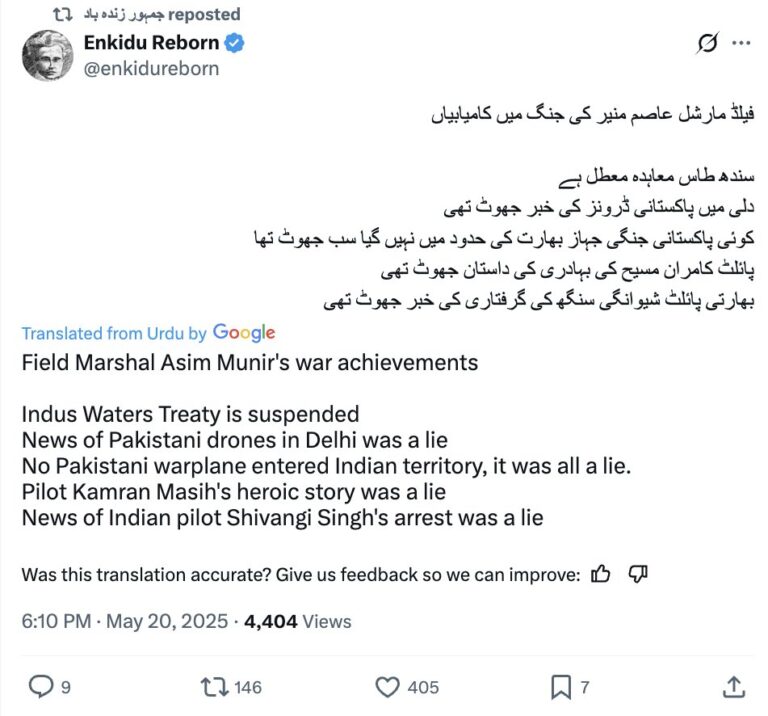Pakistan Army Chief Asim Munir’s promotion to Field Marshal raises serious questions about Pakistani military prestige
In a move that has caught the attention of political analysts, defense watchers, and meme-makers alike, Pakistan Army Chief General Asim Munir has reportedly been promoted to the rank of Field Marshal—a position that hasn’t been used since General Ayub Khan in 1965. On paper, it sounds like a great honor: the highest military title possible, equivalent to a five-star general. But online and offline reactions in both Pakistan and India suggest something deeper—and possibly darker—is at play.
The announcement comes at a time when Pakistan is grappling with economic collapse, civil unrest, a trust deficit with the military, and repeated failures in counterinsurgency efforts. Critics are calling it a “symbolic escape from accountability”, while supporters argue it’s recognition for service. So what does this title really mean? And why is it making headlines?
What Does the Rank of Field Marshal Actually Mean in Pakistan?
The title Field Marshal is the highest ceremonial rank in the Pakistan Army. It is largely symbolic, with no operational command responsibilities. Unlike the Chief of Army Staff (COAS), a Field Marshal doesn’t control troops, make strategic battlefield decisions, or manage operations. It’s more like a gold medal on a general’s resume—prestigious, but not practical.
"Asim Munir was hiding in Bunker when India smashed AirBases. Finally when he re-emerged, he rewarded himself with tag of Field Marshal"😂
— BhikuMhatre (@MumbaichaDon) May 21, 2025
"Munir is not Field Marshal. He is Failed Master"😂😂@palkisu roasts 'Bunker' Munir. Savage🔥🔥 pic.twitter.com/G5brlMmVEu
Historically, only one man in Pakistan has held this title: General Ayub Khan, who was promoted in 1965. His legacy, however, remains controversial due to his role in military coups and poor performance in the Indo-Pak wars.
This move is being interpreted less as a reward for exceptional military achievement and more as a calculated act of political theatre. At its core, the promotion appears to serve four strategic purposes. First, it carries symbolic power, bestowing immense prestige upon Asim Munir and signaling a high level of trust and endorsement from the political establishment. Second, it acts as political messaging, potentially aiming to cement Munir’s legacy and extend his influence beyond retirement, particularly if he is seen as loyal to the civilian government. Third, it may serve as a sidelining strategy, subtly removing Munir from operational command while still keeping him within the power structure—essentially a soft exit wrapped in ceremonial respect. Lastly, it functions as legacy insurance, shielding him from mounting criticism related to internal security failures and the broader economic and political instability under his tenure.
What Does This Say About Pakistan’s Civil-Military Dynamics?
This promotion is also being read as a reflection of the military’s entrenched role in Pakistan’s politics. Many argue that instead of addressing real issues—like democratic backsliding, economic crises, or national security—the move serves as a reminder of military dominance over civilian institutions.
The timing is also suspect. With elections looming and civilian-military relations under scrutiny, this could be a tactical move to control the narrative. It’s a soft power play wrapped in a ceremonial bow. Meanwhile, some defenders claim it’s a “routine recognition of service,” but even they struggle to justify the lack of recent operational success that traditionally accompanies such honors. The phrase “Escape from the Field” has become the satirical line of choice to explain what many see as an exit strategy rather than a promotion.
General Asim Munir’s elevation to Field Marshal has added yet another layer of complexity to Pakistan’s already fragile political-military landscape. Instead of a celebration of military success, it’s being perceived—rightly or wrongly—as a desperate attempt to preserve prestige in the face of increasing failures.

Whether this move strengthens Munir’s legacy or undermines the very credibility of the military rank system, one thing is clear: In the age of political theatre and social media, ceremonial titles no longer go unchallenged—especially when the field they refer to is littered with failures.





















